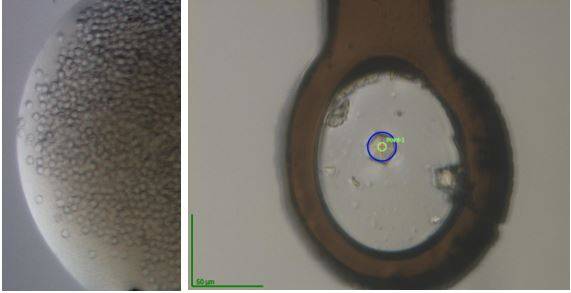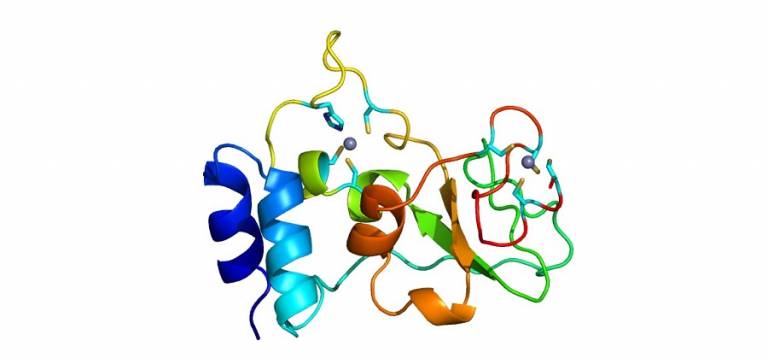Tackling the SARS CoV-2 viral genome replication machinery
18 May 2020
An international collaboration between UCL, the Lund Protein Production Platform (LP3) and the ESS DEMAX Laboratory, have initiated biophysical and structural studies of three non-structural proteins from the novel coronavirus, SARS CoV-2, the causative agent of COVID-19.
Recently this group has managed to solve and has now started to analyse one of these proteins, Non-structural protein 10.
To be able to find an efficient drug, which prohibits the novel coronavirus SARS CoV-2 from causing the disease COVID-19, one important aim is to understand how to block the virus from replicating its genomic material. By doing so the virus will “die out” over time as it fails to reproduce or make infectious particles. One way of contributing to this knowledge is to use X-rays to obtain images of the key protein structures involved in this process.
There are 16 non-structural proteins (NSPs) in SARS CoV-2 that play important roles in viral replication and transcription. The virus has excellent proofreading capabilities leading to a lower mutation rate than in other RNA viruses. Interfering with the virus’s ability to replicate and produce a mature, infectious virus capsid is a key focus for many international projects. High-resolution crystallographic studies play an important role in finding either new inhibitors or studying how existing drugs can be repurposed to block the novel coronavirus.
There are several proteins involved in the viral RNA capping and methylation machinery, ensuring RNA replication. The research team’s studies focus on three of these and a key part of this work is to determine their structures to enable high-throughput fragment-based screening in the search for novel inhibitors that can block the viral replication cycle.
The ultimate goal for this research project is to obtain high-resolution X-ray crystal structures of these proteins alone or in complex with each other to enable the search for small molecule inhibitors that disrupt their activity. These structural studies will also be complemented with other biophysical and biochemical experiments and solution scattering studies using X-rays and neutrons.
Recently the research team was able to produce crystals of one of these proteins, Nsp10 (Figure 1). Using rapid access, the data was collected remotely at the synchrotron MAX IV to 2.6 Å resolution. The structure was solved and refined, and structural analysis is ongoing (Figure 2). The work on the other SARS CoV-2 proteins continues and the research team is currently working towards crystal structures of those as well. As a next important step fragment and inhibitor screening will be initiated.

Figure 1. (left) Photo of the crystallization drop showing many hexagonal-shaped crystals of SARS CoV-2 Nsp10; (right) Single crystal of Nsp10 frozen in a 0.08 mm loop, used for data collection.

Figure 2. Ribbon diagram of SARS CoV-2 Nsp10 in its unbound form. Nsp10 contains two zinc fingers (zinc ions are shown as grey spheres).
Further information:
- Recent Science Highlight at Max IV Facility: https://www.maxiv.lu.se/article/tackling-sars-cov-2-viral-genome-replica...
- Recent Science Highlight at the European Spallation Source: https://europeanspallationsource.se/article/2020/05/14/large-scale-resea...
- Recent Science Highlight at LENS: https://www.lens-initiative.org/2020/05/15/prioritised-support-from-ess-...
- The coordinates are now available at the Protein Data Bank under accession number 6ZCT: https://www.rcsb.org/structure/6ZCT
- The relevant data has also been shared with the research community at the Covid-19 data portal in Swede and the deposited data (PDB:6ZCT) can be found listed in the protein data modelps://covid19dataportal.se/data_types/protein_data/data/
This project is an international collaboration between Professor Frank Kozielski (Main PI, School of Pharmacy, University College London), Dr Wolfgang Knecht (Lund Protein Production Platform (LP3), Lund University) and Dr Zoë Fisher (DEMAX, European Spallation Source ERIC, Lund).
The project is supported by the MAX IV rapid access call COVID-19, and the ESS DEMAX call for prioritized projects related to COVID-19 research: https://europeanspallationsource.se/article/2020/03/27/ess-demax-lab-pri...
We are grateful to staff at the Lund Protein Production Platform (LP3) for the excellent support and for performing the experiments. We thank the MAX IV Laboratory for rapid beamtime access through its COVID-19 response actions and the BioMAX beamline staff for excellent support. We acknowledge the support of the project by the ESS for projects related to COVID-19 as well as to Lund University and its faculties for support to LP3.
Contacts:
Professor Frank Kozielski, UCL School of Pharmacy, f.kozielski@ucl.ac.uk, +44 7711 263836
Dr Wolfgang Knecht, Lund University, wolfgang.knecht@biol.lu.se, +46 46 222 77 85
Dr Zoë Fisher, ESS, zoe.fisher@ess.eu, +46 712 792 250
 Close
Close

